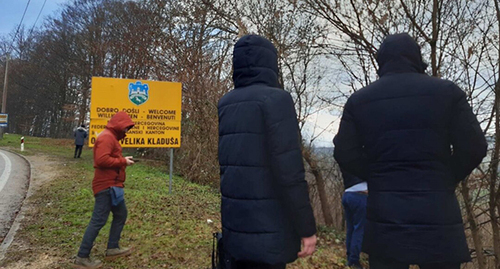
17 January 2023, 21:38
Natives of Chechnya report details of fellow countrymen's detentions in Balkans
Prior to deportation, in Bosnia and Herzegovina, the natives from Chechnya and Ingushetia, who had left Russia, were kept in dirty and cold containers; and in Croatia, law enforcers used to beat up those who had arrived, natives of Chechnya have told. In Croatia, refugees from Northern Caucasus are forced to recall their asylum requests, human rights defenders have informed.
The "Caucasian Knot" has reported that in Bosnia and Herzegovina, natives from Chechnya face problems, in particular, when they try to get to Croatia.
On December 29, 2022, Aslan, a native of Chechnya, left for Bosnia and Herzegovina, where, according to his story, natives of Chechnya and Ingushetia were filtered out. He said that there were families with small children, young people with summonses, or those who found it dangerous to return to Russia.
In Croatia, law enforcers beat up and sent to a closed camp a native of Chechnya, who had arrived at the country's airport. He was kept in a solitary cell at a refugee camp for several days; and along the way, the law enforcers used "unjustified violence" against him, the "Assembly of European Chechens" has reported.
Khasain, 24, has added that some of the natives of Chechnya, who had arrived in Croatia, were physically abused by border guards. According to his story, in Croatia, he was placed in a closed camp, where "the camp staff showed xenophobia and discrimination against Chechens on the ethnic and religious grounds." He added that he had been beaten up twice by policemen.
Since September 2022, up to a thousand people have arrived in the European Union (EU) via Croatia. Sixty of them were deported to Turkey; they were forced to recall their asylum applications, said Isa Daduev, the head of the human rights division of the "Assembly of European Chechens".
In January 2023, the flow of natives of Chechnya has significantly decreased, Mr Daduev has noted, linking this to rumours about the second mobilization phase. In his opinion, people are afraid of being detained when crossing the Russian border.
He believes that new flows of emigrants from Chechnya are in their unwillingness to take part in the special military operation (SMO) in Ukraine.
This article was originally published on the Russian page of 24/7 Internet agency ‘Caucasian Knot’ on January 16, 2022 at 01:55 pm MSK. To access the full text of the article, click here.
Author: Alikhan Mamsurov Source: СK correspondent




